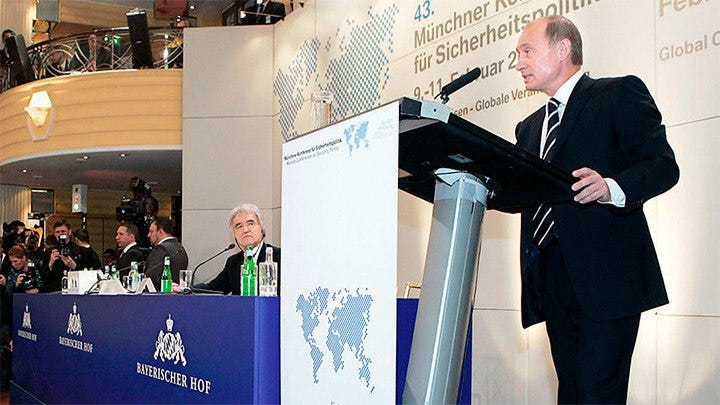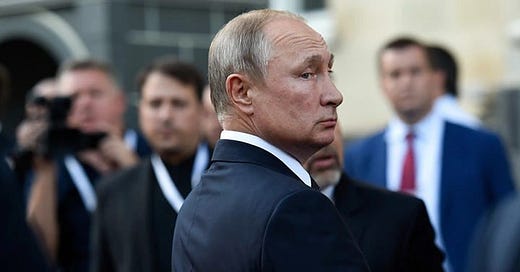Putin’s Geopolitical Revolution
Alexander Dugin highlights Putin’s 2007 Munich speech as the beginning of a multipolar revolution challenging unipolar globalism and diminishing the relevance of the UN.
The speech that Vladimir Vladimirovich Putin delivered eighteen years ago in Munich marked the first systemic and clearly formulated challenge to the globalist unipolar system. It was the beginning of a geopolitical revolution initially spearheaded solely by Russia, but gradually other powers joined the club of multipolarity. China, India, and Brazil were the first to follow, and later, other BRICS nations joined as well. This marked the institutionalization of the multipolarity Putin advocated in his Munich address.
Today, we have advanced significantly along this path. We are waging a war against globalism in Ukraine, fighting specifically against the liberal-globalist ideology. Multipolarity is becoming increasingly solidified and visible, notably through structures like BRICS, while the unipolar world is steadily moving towards its decline — especially after the start of Trump’s conservative revolution in the United States. Of course, both Trump and the “Trumpists” will attempt to preserve the unipolar world but in a different form, grounded in direct American hegemony. However, U.S. Secretary of State Marco Rubio has already acknowledged that we live in a multipolar world. This recognition is both accurate and promising.
Back in 2007, in his Munich speech, Putin emphasized the necessity of adhering to the UN Charter. However, the UN is an organization shaped by the outcomes of World War Two, where the Security Council, the distribution of power, and its mechanisms were formally rooted in the principles of the Westphalian order. The UN recognized only nation-states as sovereign actors.

The foundation of the UN also contained a contradictory formula: recognizing both the right of any nation-state to territorial integrity and the right of peoples to self-determination, a principle that inherently challenges sovereignty. This ambiguous formula has since been applied in various contexts and with differing meanings. Regardless, the UN system preserved bipolarity, along with a small segment of non-aligned countries. But overall, it reflected a fundamentally bipolar world order.
After the collapse of the Soviet Union, the bipolar world ceased to exist. Initially, globalists tried to establish a unipolar world, even proposing the dissolution of the UN in favor of creating a “League of Democracies.” However, this idea never gained institutional traction because the majority of the world rejected the concept of aligning vassal states under Western domination. The UN, in turn, was paralyzed and became a relic of the now-defunct bipolar world order. Ultimately, even the unipolar world failed to institutionalize itself and became a thing of the past.
Now, a new world order must be constructed based on multipolarity. This multipolarity needs to find a new framework of expression. Can the UN be restructured to align with the principles of a multipolar world? I doubt it, as the current UN structure reflects the combination of the Westphalian system and the ideological bipolarity established by the Yalta Conference and the outcomes of World War Two. But many wars have occurred since then, reshaping the world’s political map beyond recognition. As a result, today’s nation-states possess highly asymmetrical levels of sovereignty and actual power. Therefore, I believe that the UN is incapable of such transformation or evolution.
The time has come to consider creating a new international organization that reflects the emerging conditions of the multipolar world, with an appropriate distribution of roles within key institutions. One possible step in this direction could be the establishment of a dialogue between BRICS nations as a model of multipolarity and Trump’s America. Eventually, through a residual process, Europe might join — once it finally awakens and emerges from the liberal-globalist delirium in which it unfortunately still finds itself.





The entire West is so out of touch with reality that it's basically committing suicide. Putin and others have also said many times: "We don't have to do anything, nothing, we just have to watch the West destroy itself".
The UN is a wasteful expenditure of money for participating in a global color revolution. Make no mistake, the UN is an organization choking to death on globalist Marxism.